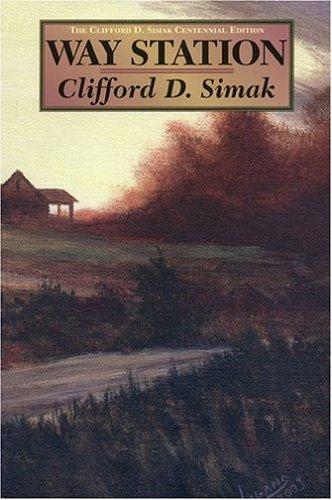4thace reviewed Way Station by Clifford D. Simak
Review of 'Way Station' on 'Goodreads'
3 stars
This book about a secret connection with the superadvanced Galactic group of species was written during a period of international tension at the highest point of the Cold War. Many people were pessimistic about the survival of our own species, and it shows through. The main character comes from a time long before this, having been recruited by his friend the alien he calls "Ulysses" back in the 19th century. The reflections he has on serving as a soldier in the US Civil War. gives the author an opportunity to muse about war and weapons, and to set up a contrast with the superadvanced technologies he encounters with the creatures who pas through his "way station." It is a side effect of the station techology that causes aging to stop, which ends up providing a plausible reason for his neighbors in the country to grow suspicious. But in the end …
This book about a secret connection with the superadvanced Galactic group of species was written during a period of international tension at the highest point of the Cold War. Many people were pessimistic about the survival of our own species, and it shows through. The main character comes from a time long before this, having been recruited by his friend the alien he calls "Ulysses" back in the 19th century. The reflections he has on serving as a soldier in the US Civil War. gives the author an opportunity to muse about war and weapons, and to set up a contrast with the superadvanced technologies he encounters with the creatures who pas through his "way station." It is a side effect of the station techology that causes aging to stop, which ends up providing a plausible reason for his neighbors in the country to grow suspicious. But in the end it is a strongly optimistic work, unlike Walter M. Miller Jr.'s A Canticle for Leibowitz which comes from around the same era with many of the same concerns.
I had a few problems with the way the main character was set up. Despite his extraordinary origin and his more than a century in the service of Galactic Central operating the transit station on Earth, Enoch is not a fascinatingly complex character. He is content to do what he needs to do to carry out his job, learning everything he can learn about in the process, and living essentially as a hermit otherwise. I thought he sort of came off as a stand in for the author, mostly free of faults or internal turmoil. The one bad thing he does in the story is a simple bit of carelessness in planning a funeral plot, nothing worse than that, and the author has to work hard to portray this as a serious faux pas when it comes to presenting ourselves to the judgement of the Galaxy. He is always decent, courageous under stress, and inclined to ruminate over things rather than acting impetuously. Besides visits from his alien friend Ulysses on occasion, he has what amoutns to a set of imaginary friends he talks to in the evenings, and a close relation with the mail carrier he is dependent upon to provide most of his daily needs. More tenuous is a romantic attraction he has to the mysterious deaf neighbor girl Lucy who seems to symbolize the best qualities of humanity, meekness, gentleness, and a sort of mystical intuition with other living creatures. For the majority of the book, Lucy displays no agency, until a moment at the climax where she seems to seize the alien plot Macguffin, an act that essentially catapults her to cosmic significance.
The last ten or twenty percent of the novel is rather different from what went on beforehand. For me, it makes it hard for me to rate it as a four-star book. It becomes more of an action adventure story. At one point, Enoch struggles hand-to-hand with an evil nameless alien criminal, a literal rat-fink, who just happens to choose Enoch's station with essentially no forethought or planning until Enoch acts to save the day. The novel had been shaping up to be a sort of a political intrigue organized by alien factions out to consign the Earth to her own misery (because of Enoch's carelessness), but now a new opportunity to obtain some fantastic alien wisdom presents itself just at a time when we are on the brink of nuclear annihilation. I lived through the 1960s myself, and can understand this desire for a way out of our predicament, but still this felt a little too pat for me.



